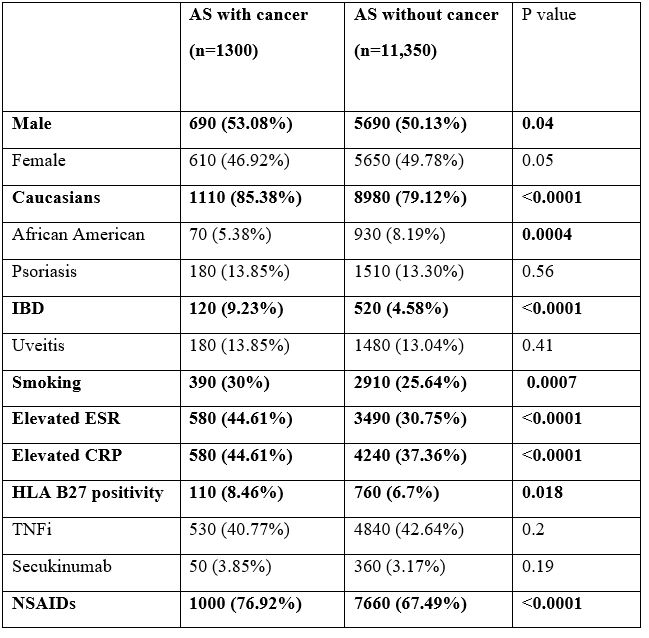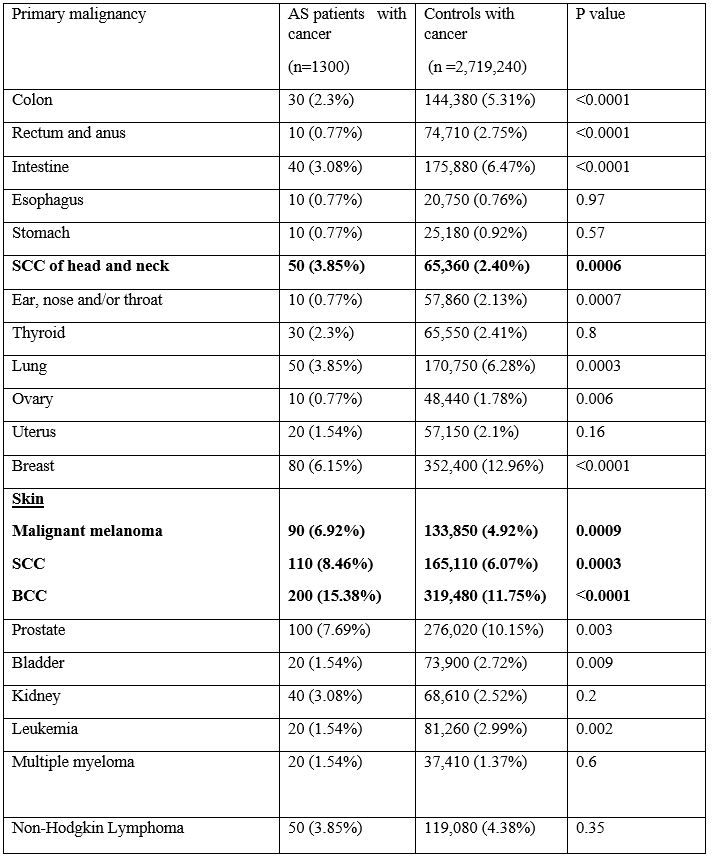Session Information
Date: Sunday, November 8, 2020
Session Type: Poster Session C
Session Time: 9:00AM-11:00AM
Background/Purpose: Increased cancer risk has been reported with Rheumatoid Arthritis (RA) and Systemic Lupus Erythematosus (SLE), but the correlation is poorly studied in Ankylosing spondylitis (AS).
Objectives:
To study the correlation between AS and cancer in the US and to further assess whether the biologic therapy imposes any cancer risk on AS patients.
Methods: This is a retrospective observational study using the IBM Explorys database, a pooled de-identified clinical database of > 60 million unique patients in the US with patient-level data. The Explorys collects aggregated, standardized, and normalized clinical data from different electronic health records automatically updated in near real-time. In Explorys, patient records are mapped into a single set of Unified Medical Language System ontologies to facilitate searching and indexing. Diagnoses, findings, and procedures are mapped into the systematized nomenclature of medicine – clinical terms (SNOMED-CT) hierarchy.
Criteria of AS included at least one visit with a rheumatologist and the diagnosis code of AS (N=14,310) between 2009-2019. We further stratified the cohorts by adding the following variables to the search tool: race, gender, smoking, laboratory data (elevated ESR and CRP, HLA-B27 status), extra-articular manifestations (psoriasis, inflammatory bowel disease or uveitis) and medication use (TNF inhibitors, secukinumab or NSAIDs). The index date was defined as the date of the first-ever malignant neoplastic disease diagnosis occurring after the qualifying AS diagnosis.
The controls group (24,542,770) included adults ≥ 18 years of age with the exclusion of positive ANA, diagnosis of RA, SLE, AS, or vasculitis, and at least one outpatient office visit during the study period. For both groups we excluded the previous diagnosis of cancer prior to 2009. A chi-square test of association was performed between the 2 groups (AS patients and controls) and the odds ratio (OR), its standard error, and the 95% confidence interval (CI) were calculated.
Results: Of the 14,310 patients with AS, only 1300 (9.08%) patients had a cancer diagnosis compared to 2,719,240 controls (11.07%). The AS patients found to have decreased odds of cancer compared to control group (OR 0.9, 95 % CI: 0.85 to 0.95, P = 0.0003). Demographics and clinical characteristics of AS patients and controls with cancer are shown in table 1. Risk factors for increased cancer risk in AS patients are shown in table 2.
Skin cancers (Squamous cell carcinoma (SCC), malignant melanoma and basal cell carcinoma), and SCC of head and neck were significantly increased in AS patients compared to controls as shown in table 3. Additionally, no significant difference in the skin cancer diagnosis was observed between AS patients who are TNFi-naive and AS patients exposed to TNFi (OR 0.9, 95% CI 0.73 to 1.1, p 0.3).
Conclusion: Our study demonstrated that skin and head neck cancers are more frequently seen in AS patients compared to controls with no rheumatic disease, but the overall cancer risk was found to be lower in the AS patients compared to the controls. Male sex, white race, HLA B27 positivity, h/o IBD, NSAID use, and elevated markers of inflammation were associated with higher odds of cancer in AS patients.
 Table 1. Demographics and other features of patients with cancer.
Table 1. Demographics and other features of patients with cancer.
 Table 2. Risk factors for cancer in patients with AS using chi-square test.
Table 2. Risk factors for cancer in patients with AS using chi-square test.
 Table 3. Comparing primary malignancies in AS patients and controls using chi-square test.
Table 3. Comparing primary malignancies in AS patients and controls using chi-square test.
To cite this abstract in AMA style:
Merjanah S, Bittar M, Magrey M. Malignancy Risk Among Patients with Ankylosing Spondylitis in the United States: A Population-Based National Study [abstract]. Arthritis Rheumatol. 2020; 72 (suppl 10). https://acrabstracts.org/abstract/malignancy-risk-among-patients-with-ankylosing-spondylitis-in-the-united-states-a-population-based-national-study/. Accessed .« Back to ACR Convergence 2020
ACR Meeting Abstracts - https://acrabstracts.org/abstract/malignancy-risk-among-patients-with-ankylosing-spondylitis-in-the-united-states-a-population-based-national-study/
